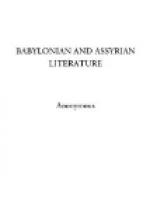(Continued on Column X.)
COLUMN X
1,2 For thy glory, O exalted Merodach 3 a house have I made. 4 May its greatness advance! 5 May its fulness increase! 6,7 in its midst abundance may it acquire! 8 May its memorials be augmented! 9 May it receive within itself 10 the abundant tribute 11,12 of the Kings of nations and of all peoples![1] 13,14 From the West to the East by the rising sun 15 may I have no foemen! 16 May they not be multiplied 17,18 within, in the midst thereof, forever, 19 Over the dark races may he rule!
[Footnote 1: Compare Dan. i. 2, “He brought the vessels into the treasure-house of his god.”]
ACCADIAN POEM ON THE SEVEN EVIL SPIRITS
TRANSLATED BY REV. A.H. SAYCE, M.A.
The following poem is one of the numerous bilingual texts, written in the original Accadian with an interlinear Assyrian translation, which have been brought from the library of Assur-bani-pal, at Kouyunjik. The seven evil spirits who are mentioned in it are elsewhere described as the seven storm-clouds or winds whose leader seems to have been the dragon Tiamat ("the deep”) defeated by Bel-Merodach in the war of the gods. It was these seven storm-spirits who were supposed to attack the moon when it was eclipsed, as described in an Accadian poem translated by Mr. Fox Talbot in a previous volume of “Records of the Past.” Here they are regarded as the allies of the incubus or nightmare. We may compare them with the Maruts or storm-gods of the Rig-Veda (see Max Mueller, “Rig-Veda-Sanhita: the Sacred Hymns of the Brahmans translated and explained,” Vol. I). The author of the present poem seems to have been a native of the Babylonian city of Eridu, and his horizon was bounded by the mountains of Susiania, over whose summits the storms raged from time to time. A fragment of another poem relating to Eridu is appended, which seems to celebrate a temple similar to that recorded by Maimonides in which the Babylonian gods gathered round the image of the sun-god to lament the death of Tammuz.




